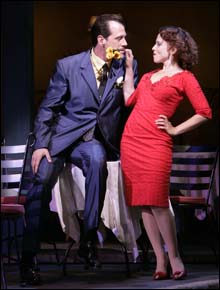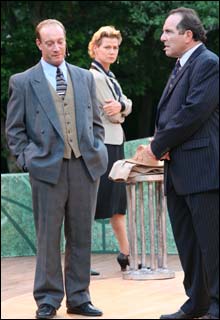The Taming of the Shrew on Boston Common; Copenhagen at the Publick By: CAROLYN CLAY8/1/2006 4:30:27 PM

THE TAMING OF THE SHREW: We find out who really rules the roost in Italian America.
|
Shakespeare’s super-dainty Kates become cannoli in The Taming of the Shrew on Boston Common (through August 13). Director Steven Maler has removed the Bard’s pugilistic courtship comedy to Boston’s North End, where Baptista, cigar-puffing father of the reluctant bride, owns an Italian restaurant that spills onto the sidewalk. Signs affixed to a street light point the way to Milano, Venezia, Firenze, etc., but Darren Pettie’s dashing Petruchio has come “to wive it wealthily” in “Bostonia,” where the first word spoken — well, yelled — is “Anthony!”, as a mother borrowed from the old Prince Spaghetti ad leans out a window to call her son to pasta. Pretty soon a block party is going on as neighbor Hortensio sweeps the street before his grocery and waitrons lay tablecloths with choreographic precision. Daughters Katharina and Bianca would seem to help out at the eatery, though Kate, a diminutive spitfire in a tight red dress, mostly does damage with slung water and trays of cutlery.
The time is the 1950s (and the music mostly Louis Prima) — which serves as a reminder that you need go no farther back than 50 years for the sexism built into Shakespeare’s 400-year-old play (in which a mercenary wooer brings a rebellious woman to heel) to seem not out of place. The winking implication is that women really rule the roost in Italian America, but they do so by pretending to a lower place in the pecking order. On the other hand, Pettie’s Petruchio is so movie-star charismatic, and is so clearly giving a performance, that for Jennifer Dundas’s stunned Kate it’s a case of you-had-me-from-“Good-morrow.” Indeed, Dundas’s rendering of the act-five speech admonishing her fellow brides to bend to the good deal that is traditional marriage is less lecture than foreplay. Petruchio was always playing a sex game, and now he’s got a willing partner.
Presenting its 11th offering of free Shakespeare on Boston Common, Commonwealth Shakespeare Company plays fast and loose with the Bard’s early comedy. The accents veer from Sicily to Southie, and there’s plenty of non-iambic ad-libbing going on. Remo Airaldi’s Hortensio even strays from the text within its confines, uttering every “sweet Bianca” in a lecherous growl that borders on obscenity. Paul Farwell’s Baptista is a smooth old-country operator, and there is a spry, athletic turn by Antonio Edwards Suarez as Petruchio’s hyperactive manservant, Grumio, who arrives with his master on a leopard-skin-seated Vespa. (Nice product placement for corporate sponsor Herb Chambers Vespa.) Angie Jepson is the blonde, crinolined vixen of a Bianca, who gets up to some steamy pre-marital canoodling on the restaurant roof deck with Scott Barrow’s geeky Lucentio.
But the heart and soul of any Shrew are its Kate and Petruchio, and tiny Dundas and tall Pettie add up to some great physical comedy, their one-on-one battles of wit customized for fiery featherweight and bravura juggler of little women. These two flip each other like erotic pancakes, one on top, now the other. Pettie’s is the flashier performance: the classically trained, well-spoken actor can leap café tables at a single bound and carry a gowned body like a beer cooler on his shoulder. He gives a bravura performance as a self-mocking if swashbuckling tenderheart whose goal is rapport. Dundas has perhaps the harder job: taking Kate on a journey from father-wounded meanie to sexually awakened co-conspirator. And Maler doesn’t always provide her a detailed road map. For most of the first act, she’s feisty and light enough to be tossed around like a beach ball. (She’s not the only projectile in a staging where everything from mutton chops to beach chairs goes flying.) Then she spends the second in a daze of deprivation mixed with sex attraction. That’s until she finally figures out what her crazy new husband wants: a tiger in bed pretending to be Jackie Kennedy when upright.
ADVERTISEMENT
 |

COPENHAGEN: It is fun in its impassioned, intellectual way.
|
As Danny Kaye sings in Hans Christian Andersen, “Wonderful, wonderful Copenhagen.” He was warbling of the town, not the play, but the adjective applies. Michael Frayn’s heady and mysterious meditation built on a 1941 meeting between Nobel Prize–winning physicists Niels Bohr and Werner Heisenberg applies the latter’s famed uncertainty principle to both ethics and history. And unlike Proof, where mathematics is a mere MacGuffin, Copenhagen weaves complex science into its treatment of morality, memory, and perception. It’s an odd choice of a play to do outdoors, where Tivoli rather than Copenhagen’s Institute for Theoretical Physics is evoked, and the actors portraying Heisenberg, Bohr, and the latter’s wife, Margrethe, have to wear headsets. But Diego Arciniegas’s atmospheric staging for the Publick Theatre (in repertory through September 10) makes good use of its verdant, shadowy surrounds, particularly when Bohr and Heisenberg take the brief, stormy walk that ended their friendship and on whose conversational content they never could agree. Gabriel Kuttner and Susanne Nitter give nuanced performances as the defensive Heisenberg and questioning Margrethe. If Barry Press comes across less as the competitive, avuncular scientist likened by his colleagues to the pope than as a plucky thug, well, two out of three ain’t bad.
The folks in front of me left at intermission, announcing that they thought outdoor theater was supposed to be fun. But the intricately constructed Copenhagen is fun in its impassioned, intellectual way. It begins with the ghosts of the principals — nigglers from the beyond, heard first in voiceover — still trying to come to an agreement about that meeting in the midst of World War II between the man Hitler hoped would develop an atomic bomb and the half-Jewish Dane who had been his mentor. Why had Heisenberg come to Copenhagen? To see old friends from the halcyon 1920s, when he and Bohr came up, respectively, with the uncertainty and complementarity that were the cornerstones of Quantum Mechanics? To fish for information about the Manhattan Project? To seek absolution? Or simply to ask whether “a physicist has the moral right to work on the practical exploitation of atomic energy?”
|
 |
|
|
- SEX (CIRCA 2006) Oral is the new second base, the “mostly” girls keep on kissing girls, and the Bro Job has arrived (but is still not ready for its close-up)
- REVENGE OF THE NERDS Three gamer geeks from Needham made a vid-cast that was slagged mercilessly on the web — and then MTV called
- THE CARTOON NETWORK GOES HEAVY METAL Brendon Small’s Metalocalypse adventure
- DOES YOUR LIFE SUCK? In the MySpace-meets-Matrix online world of Second Life, everyone is sexy, real money flows, and pixels are the only limitation
- SPIN CITY The BPD is using its online presence not to inform citizens but to demonize them. Just ask the kids whose birthday party the cops busted up in roxbury a few weeks ago
- E-ZPASS ON ETHICS Turnpike executives cruise past the state’s ethics rules
|

|